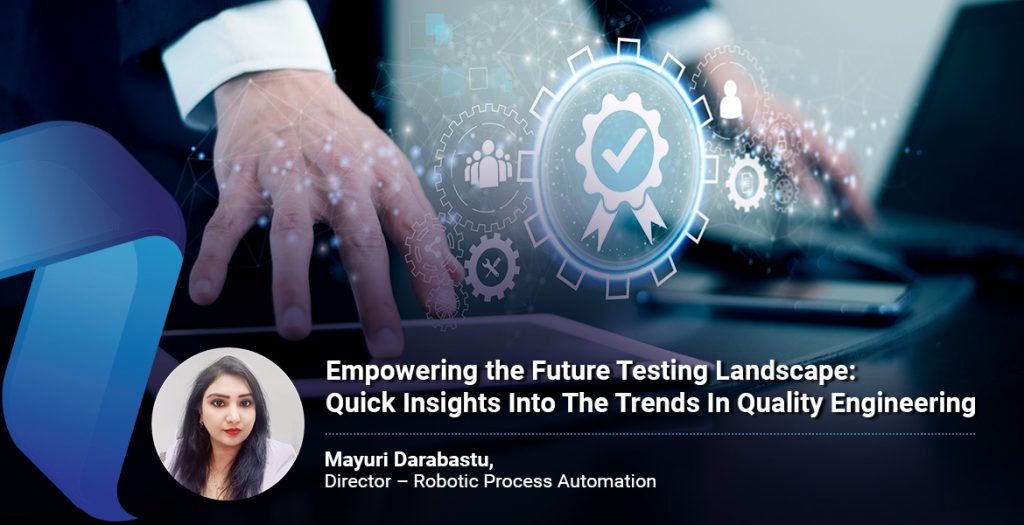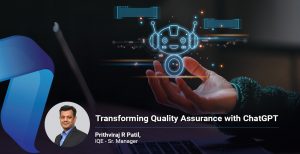In today’s fast-paced and hyper-connected world, where digital technologies permeate every aspect of our lives, the role of quality engineering has never been more critical. Quality engineering is fundamental in ensuring that the software and systems we depend on are not only functional but also reliable, secure, and scalable. As businesses undergo digital transformations and embrace technologies such as Cloud Computing, Artificial Intelligence (AI), and the Internet of Things (IoT), the importance of quality engineering cannot be overstated.
As technology continues to advance at a rapid pace, the landscape of Quality Assurance (QA) is undergoing a transformation. Anticipating future trends in QA is essential for organizations to adapt, innovate, and thrive in an ever-changing digital environment. By staying ahead of emerging technologies, evolving methodologies, and shifting market demands, QA professionals can effectively navigate the challenges and opportunities that lie ahead.
AI & Machine Learning Integration
AI and ML algorithms can analyze historical test data, code repositories, and system behavior to automatically generate test cases. These generated test cases are tailored to specific scenarios, edge cases, and user behavioral patterns, thereby increasing test coverage and effectiveness. further to it, by identifying patterns, correlations, and anomalies in the data, AI-powered systems can proactively alert QA teams to potential issues before they manifest in production. This predictive defect analysis helps organizations mitigate risks, reduce rework, and improve software quality and reliability.
We can leverage AI and ML technologies to optimize test execution by intelligently selecting and prioritizing test cases based on factors such as code changes, system dependencies, and test coverage goals. Through techniques such as predictive modeling, reinforcement learning, and genetic algorithms, AI-powered testing frameworks can dynamically adjust test suites to maximize coverage and minimize redundancy. We can further analyze system logs, performance metrics, and user interactions to detect anomalies and unusual behavior in real-time. By correlating events, identifying patterns, and performing root cause analysis, AI-powered systems can pinpoint the underlying causes of issues and deviations. This proactive approach to anomaly detection and root cause analysis enables organizations to address issues promptly, minimize downtime, and optimize system performance and reliability.
Through techniques such as self-healing tests, intelligent test data synthesis, and dynamic test script generation, AI-powered test automation frameworks can reduce maintenance overhead, increase test robustness, and adapt to changing test conditions. This adaptive test automation approach enhances testing scalability, resilience, and maintainability, enabling organizations to keep pace with rapid development cycles and evolving technologies.
“Embracing the future of quality assurance means integrating innovative technologies and methodologies to enhance the precision, efficiency, and security of digital solutions, ensuring that businesses not only keep pace with rapid technological advancements but also lead the charge in defining them.”
Mayuri Darabastu
Director – Robotic Process Automation
Emphasis on DevSecOps and Continuous Security Testing:
With the growing frequency and sophistication of cyber threats, security is becoming an increasingly important aspect of QA. DevSecOps practices, which integrate security into the entire software development and delivery pipeline, are gaining traction as organizations seek to strengthen their security posture and mitigate risks. Continuous security testing, enabled by automation and real-time monitoring tools, allows organizations to proactively identify and remediate security vulnerabilities throughout the software development lifecycle. By prioritizing security as an integral part of QA, organizations can build trust, protect assets, and ensure compliance with regulatory requirements.
Adoption of Low-Code and No-Code Testing Solutions
The rise of low-code and no-code development platforms is driving a corresponding demand for low-code and no-code testing solutions. These platforms empower non-technical users to create and execute test cases without writing traditional code, thereby democratizing the testing process and accelerating time-to-market. By simplifying and streamlining test automation efforts, low-code and no-code testing solutions enable organizations to scale their QA efforts, reduce reliance on specialized skills, and foster collaboration between development and QA teams.
Evolution of Testing in Agile and DevOps Environments
As organizations embrace Agile and DevOps methodologies to deliver software at a faster pace, testing practices are evolving to keep pace with the demands of Continuous Integration and Continuous Delivery (CI/CD) pipelines. Automated testing, Infrastructure as a Code (IaaC), and containerization technologies are becoming indispensable tools for QA professionals seeking to achieve greater speed, efficiency, and reliability in their testing efforts. By aligning testing activities with Agile and DevOps principles, organizations can achieve seamless integration, faster feedback loops, and higher levels of customer satisfaction.
Thus, navigating the evolving landscape of quality assurance requires a proactive approach to anticipating and embracing future trends. By integrating AI and ML technologies, adopting shift-left and shift-right testing approaches, emphasizing DevSecOps and continuous security testing, leveraging low-code and no-code testing solutions, and evolving testing practices in Agile and DevOps environments, organizations can position themselves for success in the dynamic and competitive world of software development.






